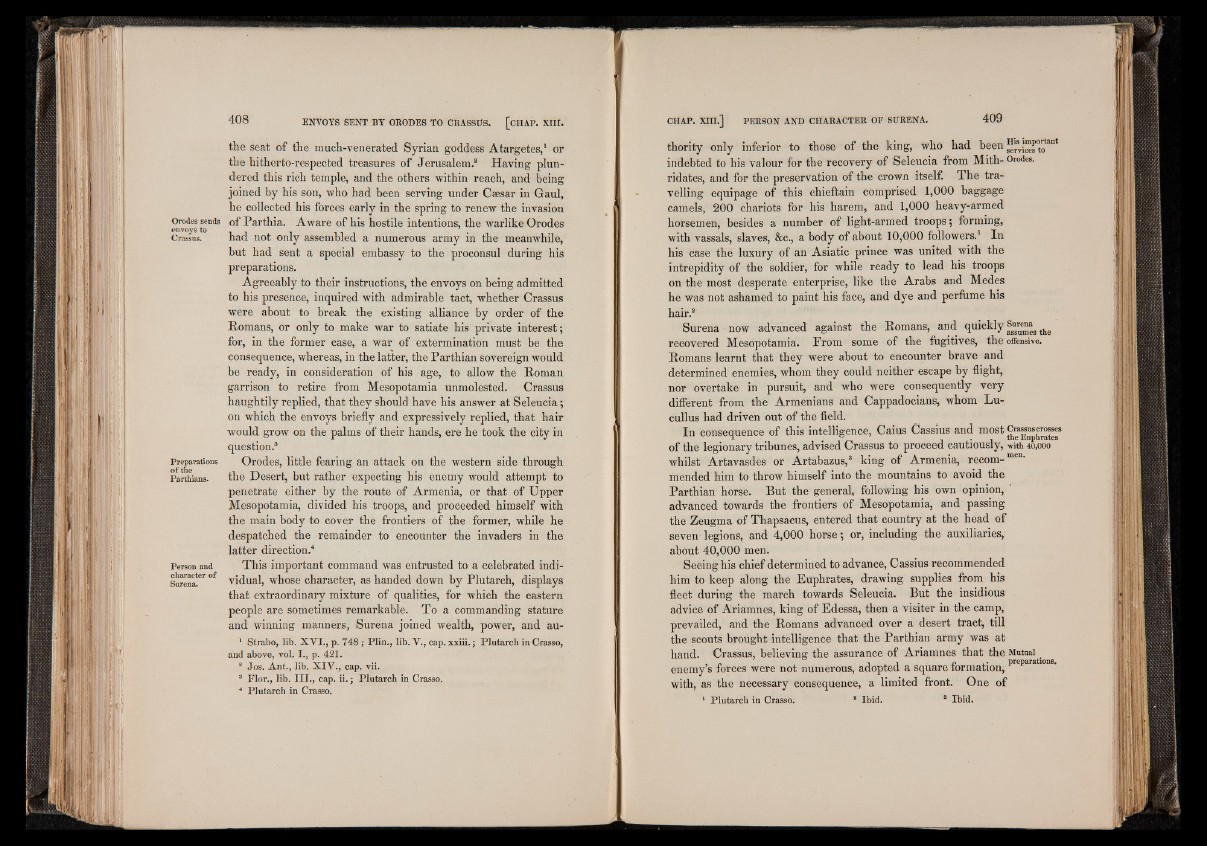
Orodes sends
envoys to
Crassus.
Preparations
of the
Parthians.
Person and
character of
Sureña.
the seat of the much-venerated Syrian goddess Atargetes,1 or
the hitherto-respected treasures of Jerusalem.8 Having plundered
this rich temple, and the others within reach, and being
joined by his son, who had been serving under Csesar in Gaul,
he collected his forces early in the spring to renew the invasion
of Parthia. Aware of his hostile intentions, the warlike Orodes
had not only assembled a numerous army in the meanwhile,
but had sent a special embassy to the proconsul during his
preparations.
Agreeably to their instructions, the envoys on being admitted
to his presence, inquired with admirable tact, whether Crassus
were about to break the existing alliance by order of the
Homans, or only to make war to satiate his private interest;
for, in the former case, a war of extermination must be the
consequence, whereas, in the latter, the Parthian sovereign would
be ready, in consideration of his age, to allow the Homan
garrison to retire from Mesopotamia unmolested. Crassus
haughtily replied, that they should have his answer at Seleucia;
on which the envoys briefly and expressively replied, that hair
would grow on the palms of their hands, ere he took the city in
question.3
Orodes, little fearing an attack on the western side through
the Desert, but rather expecting his enemy would attempt to
penetrate either by the route of Armenia, or that of Upper
Mesopotamia, divided his troops, and proceeded himself with
the main body to cover the frontiers of the former, while he
despatched the remainder to encounter the invaders in the
latter direction.4
This important command was entrusted to a celebrated individual,
whose character, as handed down by Plutarch, displays
that extraordinary mixture of qualities, for which the eastern
people are sometimes remarkable. To a commanding stature
and winning manners, Surena joined wealth, power, and au-
1 Strabo, lib. X V I., p. 748 ; Plin., lib. V ., cap. x xiii.; Plutarch in Crasso,
and above, vol. I., p. 421.
8 Jos. Ant., lib. X IV ., cap. vii.
3 Flor., lib. I I I ., cap. ii.; Plutarch in Crasso.
4 Plutarch in Crasso.
thority only inferior to those of the king, who had been
indebted to his valour for the recovery of Seleucia from Mith- Orodes.
ridates, and for the preservation of the crown itself. The travelling
equipage of this chieftain comprised 1,000 baggage
camels, 200 chariots for his harem, and 1,000 heavy-armed
horsemen, besides a number of light-armed troops; forming,
with vassals, slaves, &c., a body of about 10,000 followers.1 In
his case the luxury of an Asiatic prince was united with the
intrepidity of the soldier, for while ready to lead his troops
on the most desperate enterprise, like the Arabs and Medes
he was not ashamed to paint his face, and dye and perfume his
hair.8
Surena now advanced against the Homans, and quickly lhe
recovered Mesopotamia. From some of the fugitives, the offensive.
Homans learnt that they were about to encounter brave and
determined enemies, whom they could neither escape by flight,
nor overtake in pursuit, and who were consequently very
different from the Armenians and Cappadocians, whom Lu-
cullus had driven out of the field.
In consequence of this intelligence, Caius Cassius and most
of the legionary tribunes, advised Crassus to proceed cautiously, with 40,000
whilst Artavasdes or Artabazus,3 king of Armenia, recoin-“6“-
mended him to throw himself into the mountains to avoid the
Parthian horse. But the general, following his own opinion, '
advanced towards the frontiers of Mesopotamia, and passing
the Zeugma of Thapsácus, entered that country at the head of
seven legions, and 4,000 horse; or, including the auxiliaries,
about 40,000 men.
Seeing his chief determined to advance, Cassius recommended
him to keep along the Euphrates, drawing supplies from his
fleet during the march towards Seleucia. But the insidious
advice of Ariamnes, king of Edessa, then a visiter in the camp,
prevailed, and the Romans advanced over a desert tract, till
the scouts brought intelligence that the Parthian army was at
hand. Crassus, believing the assurance of Ariamnes that the Mutual
enemy’s forces were not numerous, adopted a square formation, p eparatl0ns-
with, as the necessary consequence, a limited front. One of
1 Plutarch in Crasso. 8 Ibid. 3 Ibid.